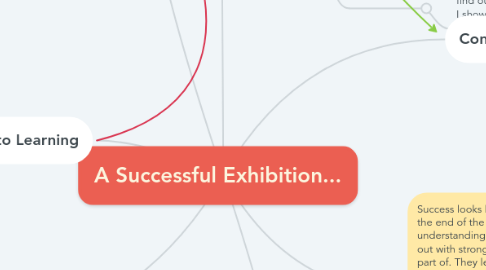A Successful Exhibition...
by Katrina Schmudlach

1. In no particular order...Fluid.
2. Approaches to Learning
2.1. Research Skills
2.2. Social Skills
2.3. Communication Skills
2.4. Self-Management Skills
2.5. Thinking Skills
3. Inquiry Process
3.1. Tuning In
3.1.1. What do we know? What do we notice?
3.2. Finding Out
3.2.1. Use the key concepts to ask questions & then use strategies to find out more.
3.3. Sorting Out
3.3.1. Synthesizing and organizing our information we discovered.
3.4. Going Further
3.4.1. Now what? What is our responsibility with this new knowledge? How can we apply it?
3.5. Taking Action
3.5.1. Participation, Lifestyle Changes, Social Justice, Social Entrepreneurship, Advocacy
3.6. Reflection
3.6.1. Continuous; throughout the whole process. How do I notice my thinking change as I find out more? Am I using my ATL skills? Am I showing my LP traits? How can I improve?
4. I consider the ATLs as the building blocks to a successful exhibition. By explicitly teaching these skills, we build the student's confidence and make attaining success manageable. Through these skills, we can then delve deeper into the inquiry process, and thus, conceptual understanding.
5. The inquiry process drives the learning and builds the conceptual understanding. Students learn to ask questions and to challenge what is to what could be. Through the inquiry process, students can start further developing their ATLs to go further.
6. Conceptual Understanding
6.1. I see this happening all around my, my city, and the world...
6.2. I can apply this knowledge to my life...
6.3. If this is how this works, then I can... I wonder if I can...
7. Success looks like some form of conceptual understanding by the end of the process. Each student might take a different understanding through their learning journey, but they come out with stronger knowledge about the world that they are a part of. They leave with new ideas of where to explore next to continue building further layers of conceptual knowledge.


